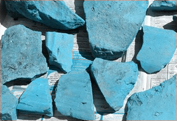Baden Powell Centre - New Venue
|
|
As indicated in last month’s newsletter, we have had to look for a new venue for
our monthly meetings. Fortunately, with the help of Tom Glover we have been able
secured the Baden Powell Centre (District Scout Headquarters) in Greenough Street, starting with our next
meeting. This promises to be a very good location as the premises are eminently
suitable for our requirements. There is ample parking and, on most occasions, a
choice of two rooms each with blackouts and more than adequate seating - all for a rent
that is more than reasonable. The Baden Powell Centre is located at the Central Park end of Greenough Street - on the right if approached from Hindley and the left if approached from
Central Park.
There is, however just one small problem. For the next two meetings Wigan Rugby
League have fixtures which coincide (i.e. June and July). But after that they have no more
Wednesday games and next season, of course, they will play their matches at the new
stadium so we should not have any problems.
Mary Rose Medicines
It seems many years since the Mary Rose was hoisted, dripping with promise, from
the Solent. It was in fact in 1982 that this momentous event took place. The
wreck was first discovered as early as 1969 when a sonar survey discovered a "sea-bed
anomaly", which was finally identified as the Mary Rose in May 1971. Henry's
warship was built between 1509 and 1511 and capsized during an engagement with the French
in 1545. Her rediscovery and subsequent raising are regarded as "seminal
events" in the history of nautical archaeology.
Many Tudor artefacts were found at the site of the wreck (I am sure many of you will
remember the talk Lucy Pile gave our society in 1995). In the main these were well
preserved by the seabed mud and provided important information, not just about nautical
happenings, but also about everyday life in Tudor times. It seems that research on
the finds is still in progress. The British Archaeology April web site ran an
interesting story about research done by Brendan Derham, a doctoral student at Bradford
University, into medicines used on board the Mary Rose.
A chest was found embedded in the mud near the wreck. In it were ceramic and
wooden jars containing the residues of medicines and ointment, which must have been in use
on the Mary Rose and, by implication, on other warships of the time. It is not
surprising to discover that most of the treatments were for wounds and burns. Large
quantities of pine resin were found. This antibiotic dressing prevents fluid loss
and dehydration. Incredibly another preparation contained the active ingredient,
zinc oxide, which is still in use today. In Tudor times it was mixed with animal fat
before being applied - today it is an ingredient of Calamine lotion. Another
application, consisting of copper salt in animal fat, was still being used, until
recently, as an antibiotic treatment for skin ulcers. The chest and its contents
were so well preserved in their bed of mud that even some scraps of bandages survived the
centuries. Another surprising find was a jar of peppercorns. Textbooks of the
time tell us that they were used both as a dressing for rheumatic aches and, when taken
internally, were effective against gastric spasms.
Few medicines for internal consumption were found. The reason for this,
apparently, is because the ship’s surgeons could not prescribe such medicines.
Their prescription remained the prerogative of physicians, an elite group who seldom
committed themselves to the rigours encountered aboard a warship. – A M
Cyprus
Fancy excavating in Cyprus this summer? The University of Wales is running the site for
students and ‘paying guests’. Based at the Akamas peninsula of West Cyprus the
site is believed to be a medieval monastery. Assisted accommodation has been arranged
through the Cypriot Tourist Office with a minimum stay of one week. Further details from
me at the meeting.
Next Meeting
(Wednesday 2nd June at the our new venue the BP Centre in Greenough Street at 7.30 pm
as usual.) This month’s speaker is Ian Winstanley, postponed from April, whose
talk is entitled ‘The Woodpit Explosion at Haydock 7th June 1878’.
Hope to see you there - B.A.
|



